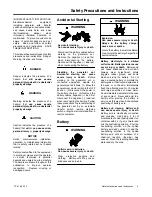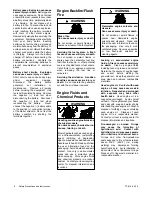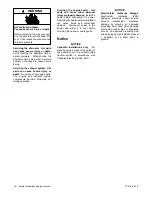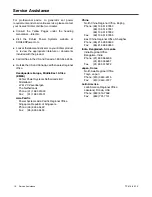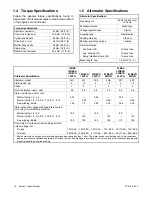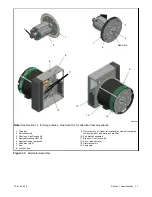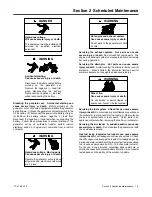
TP-6198 3/15
6
Safety Precautions and Instructions
Battery gases. Explosion can cause
severe injury or death.
Battery gases
can cause an explosion. Do not smoke
or permit flames or sparks to occur near
a battery at any time, particularly when
it is charging. Do not dispose of a
battery in a fire. To prevent burns and
sparks that could cause an explosion,
avoid touching the battery terminals
with tools or other metal objects.
Remove all jewelry before servicing the
equipment. Discharge static electricity
from your body before touching
batteries by first touching a grounded
metal surface away from the battery. To
avoid sparks, do not disturb the battery
charger connections while the battery
is charging. Always turn the battery
charger off before disconnecting the
battery connections.
Ventilate the
compartments containing batteries to
prevent accumulation of explosive
gases.
Battery short circuits. Explosion
can cause severe injury or death.
Short circuits can cause bodily injury
and/or
equipment
damage.
Disconnect
the
battery
before
generator
set
installation
or
maintenance.
Remove all jewelry
before servicing the equipment. Use
tools with insulated handles. Remove
the negative (--) lead first when
disconnecting the battery. Reconnect
the negative (--) lead last when
reconnecting the battery.
Never
connect the negative (--) battery cable
to the positive (+) connection terminal
of the starter solenoid. Do not test the
battery condition by shorting the
terminals together.
Engine Backfire/Flash
Fire
Risk of fire.
Can cause severe injury or death.
Do not smoke or permit flames or
sparks near fuels or the fuel system.
WARNING
Servicing the fuel system. A flash
fire can cause severe injury or death.
Do not smoke or permit flames or
sparks near the carburetor, fuel line,
fuel filter, fuel pump, or other potential
sources of spilled fuels or fuel vapors.
Catch fuels in an approved container
when removing the fuel line or
carburetor.
Servicing the air cleaner. A sudden
backfire can cause severe injury or
death.
Do not operate the generator
set with the air cleaner removed.
Engine Fluids and
Chemical Products
Handling caustic engine fluids and
chemical products.
Can cause severe chemical burns,
nausea, fainting, or death.
Most chemicals such as used engine
oil, antifreeze/coolant, rustproofing
agent, inhibiting oil, degreasing
agent, spray paint, and adhesives are
hazardous to health. Read and follow
the user information found on the
packaging. Avoid inhalation and skin
contact. Use only in well-ventilated
areas and use a protective mask
when spraying. Store engine fluids
and chemical products in a locked
cabinet. Contact your local recycling
center for disposal information and
locations.
WARNING
Flammable engine solvents and
cleaners.
Can cause severe injury or death.
Do not smoke or permit flames or
sparks near flammable engine
solvents and cleaners. Read and
follow the user information found on
the packaging. Use only in well-
ventilated areas. Never use gasoline
or low flash-point solvents as
cleaning agents.
WARNING
Leaking or accumulated engine
fluids. A fire can cause severe injury
or death.
Clean up engine fluids
including fuel, oil, grease, and coolant.
Determine the source of engine leaks
and correct before starting the
generator set. Keep the generator set
area clean and remove combustible
materials.
Used engine oil. Contact with used
engine oil may cause severe skin
irritation. Repeated and prolonged
skin exposure may have other
health risks.
Used engine oil is a
suspected carcinogen. Avoid contact
with skin. Thoroughly wash your hands
and nails with soap and water shortly
after handling used engine oil. Wash or
dispose of clothing or rags containing
used engine oil.
Dispose of used
engine oil in a responsible manner.
Contact your local recycling center for
disposal information and locations.
Fire-damaged or burned O-rings
may
cause
the
formation
of
hydrofluoric acid.
Contact with
hydrofluoric acid may cause severe
skin irritation and chemical burns.
O-rings and other fluoroelastomer
seals exposed to fire or temperatures
above 316
_
C (600
_
F) (i.e., during
welding) may decompose forming
hydrofluoric acid. Avoid inhalation or
skin contact. Do not incinerate O-rings.
Dispose of O-ring waste material in a
responsible manner.
Содержание 15/30RES
Страница 2: ......
Страница 18: ...TP 6198 3 15 18 Section 1 Specifications Notes ...
Страница 62: ...TP 6198 3 15 62 Section 5 Component Testing and Adjustment Notes ...
Страница 71: ......





